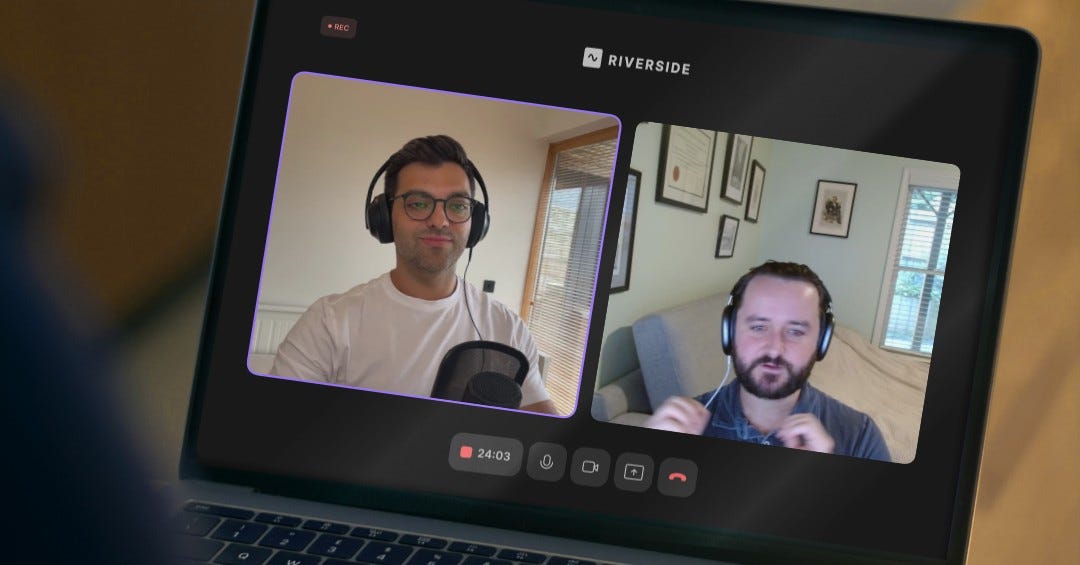The Founder Behind the Algorithm
How Rory Semple is Building Teckel Capital with Code, Conviction, and Curiosity
When you think of a startup founder, you might picture someone launching an app, selling a product, or pitching to VCs. Rory Semple is building something different. As the co-founder of Teckel Capital, he’s not selling a product — he’s building an algorithm. His customers don’t buy software. They invest in a system.
In this interview, we dive into the world of quantitative trading — and what it’s like to start a fund from scratch, while still working a full-time consulting job. Rory shares the real story behind the numbers, the moments of doubt, the tough calls, and the long-term vision behind Teckel Capital.
“Our product is our algorithm.”
“It’s not something you buy — it’s something you invest in. And if it works, we grow together.”
Teckel Capital isn’t a typical startup. It’s a quantitative trading firm run by two founders: Rory, the engineer and trader, and Matteo, the business builder.
They’re building something quietly ambitious: an automated trading strategy called Athena that’s been live on market data for over two years. Behind it? Dozens of experimental algorithms in testing, all designed to expand and future-proof the portfolio.
“We’re still working full-time jobs.”
“It’s not easy, and I wouldn’t recommend it long-term. But the automation makes it possible — for now.”
Rory and Matteo met at a consulting firm. They’re still there — juggling Teckel during nights and weekends. That’s only possible because from day one, the infrastructure was built for automation and scale.
The goal? Reach the inflection point where the fund can support full-time focus. Until then, it’s a careful balance of momentum, market behavior, and burn rate.
“There’s survivorship bias in finance — and in startups.”
“People see the one algorithm that worked. They don’t see the 100 that didn’t.”
Building a fund that outperforms the market isn’t as simple as writing code and hitting run. Rory has spent years testing, killing, and retesting algorithms that didn’t pan out.
He describes Teckel’s development process as a live R&D lab — always experimenting with 30 to 40 strategies in the background, looking for uncorrelated returns and risk protection.
“We’re still pre-revenue — by choice.”
“We don’t charge fees yet. That’s part of earning trust.”
Teckel Capital is currently running in a “friends and family” structure — no fees, no pressure. It’s a deliberate decision to wait until the fund’s track record and the market performance align before monetizing.
The pivot to a full-fee structure is on the roadmap — but timing matters. In investing, performance is tied to trust. And trust takes time.
“It’s just like a startup.”
“We have customers. We have product-market fit. We’re raising capital. It’s not so different.”
While Teckel isn’t building a SaaS app, the startup mechanics are surprisingly familiar. They’re testing market fit, tracking performance, iterating on features (algorithms), and pitching to investors.
The big difference? Their “product” is money. And performance is the feature people care about most.
“We only trade highly liquid ETFs.”
“Performance matters. But scalability matters more.”
When building Athena, Rory had to think about scale from day one. It’s easy to make money trading $10,000. It’s harder to make money managing $100 million.
Teckel’s approach favors highly liquid ETFs that can scale without compromising execution. Crypto, for now, is in the lab. But ETFs are the foundation of their strategy.
“Markets are irrational. And that’s the challenge with AI.”
“A lot of AI is built on rational assumptions. Markets don’t work that way.”
Rory is excited about AI’s potential in capital markets — but cautious about overfitting and backward-looking models. ChatGPT might help research stocks, but real strategy demands forward-thinking, human judgment, and resilience to noise.
Teckel’s algorithm isn’t based on technical analysis or trading hype. It’s rooted in macroeconomic cycles, designed to withstand volatility, not react to it.
“I’m not a 5 a.m. founder.”
“I’ve tried. It doesn’t work for me. I find inspiration in random places — even the grocery store.”
Instead of cold plunges and miracle mornings, Rory works in long, focused blocks — sometimes late into the night. His days often stretch 12 to 13 hours, split between consulting and Teckel.
His co-founder Matteo balances the equation with relationship building and capital raising. Together, their complementary strengths keep the business moving forward.
“We had to navigate some tough conversations.”
“Imagine raising money… then watching the market dip. That shakes your conviction fast.”
Shortly after Teckel’s first fundraising push, the market dropped. That meant immediate negative performance on freshly raised capital.
Rory credits their investors for staying calm — and emphasizes how important it is to manage expectations in a business where timing and trust are everything.
“My definition of success is freedom.”
“If you want to play golf on a Tuesday morning, and you can — that’s success.”
For Rory, success isn’t a number. It’s autonomy. The ability to decide what your day looks like, without needing permission.
That’s what Teckel Capital is ultimately about: building something sustainable that creates freedom — for its investors, and its founders.
Final thoughts: Building a fund is just building a startup with spreadsheets instead of servers.
“We’re not selling a product. But we’re solving a problem.”
At its core, Rory’s story is a founder story — full of experiments, pivots, pressure, and progress. Whether you’re selling code or capital, the skills are the same: conviction, curiosity, and the courage to build something from nothing.
Want to hear the full unfiltered conversation with Rory Semple?


